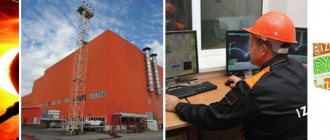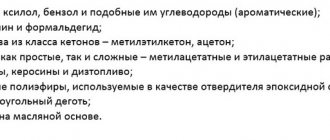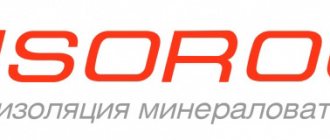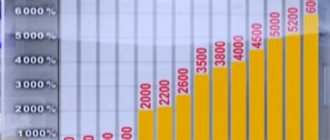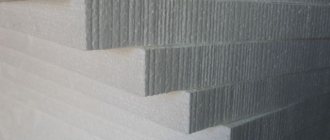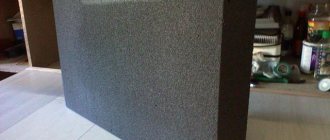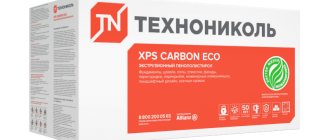Fibrous materials
- Basalt wool is distinguished by a fairly low coefficient of thermal conductivity of up to 0.05 W/m2 K. It shows the amount of energy that passes through a layer of insulation with an area of 1 square meter with a temperature difference of 1 Kelvin (equal to 1 degree Celsius). A reliable thermal barrier is provided by still air located between the randomly located fibers of the slab or roll.
- Knauf mineral wools are non-flammable materials, do not spread combustion over their surface, and do not emit substances harmful to breathing when heated. 3. Stone wool has high biological and chemical resistance. Does not react with active chemicals, is not used as food by rodents and insects, and does not spread fungus and mold in its volume. Does not deteriorate when exposed to sunlight.
- Knauf mineral wool is a material with a high degree of vapor permeability, which allows it to be used with so-called “breathable” materials. These include wood, foam and aerated concrete, and slag blocks. Due to their internal structure, they absorb moisture when there is an excess of it in the air and release it when there is a deficiency. On the one hand, this is a good quality that allows you to maintain indoor humidity at a constant level. On the other hand, the negative side is that there is a danger of the development of microorganisms on the surface under the insulation.
- Knauf mineral wool confirms its environmental safety with appropriate certificates. It contains no substances harmful to human health. During operation, Knauf mineral wool does not emit harmful substances and fibers into the atmosphere.
- Dense slabs are an excellent sound insulator, reducing noise levels by 45 dB.
- A distinctive characteristic of Knauf insulation is its long service life. If the manufacturer sets this period at 50 years, then the fact is much longer.
Areas of use
The manufacturer has developed special modifications of insulation for any construction needs, differing in density, shape and size. KNAUF mineral wool will find application anywhere:
- Can be used for thermal insulation of roofs. (Ventilated or non-ventilated)
- Insulation and soundproofing of floors.
- Thermal insulation of the foundation and plinth of buildings, in order to maintain soil stability in winter.
- External and internal insulation of walls of various buildings.
- Thermal insulation of balconies, basements and loggias
- Preventing freezing of non-residential premises, production areas and warehouses.
- Insulation of air conditioning and ventilation systems.
What is ecowool: pros and cons
Thanks to the wide range of products, you can find the optimal Knauf insulation option for any purpose. The main types of Knauf mineral wool and their properties are described below.
For the dacha
TeploKnauf Dacha is one of the early developments in the field of insulation of attic and interfloor ceilings. It is recommended for use in seasonal summer cottages and outbuildings. Characteristics of Knauf dacha:
- thickness -100 mm;
- roll length – 7.4 m;
- width – 1 m 22 cm.
The density of the heat insulator is measured in kg/m3 15 Dacha. A roll of Knauf dacha insulation contains 18 m2 of material.
Advantages of KNAUF insulation
- Low thermal conductivity coefficient.
- High sound absorption coefficient.
- High fire resistance. The entire line of insulation materials is marked as non-combustible materials NG.
- Maximum biostability: mold does not grow in insulation materials.
- Insulation based on mineral wool is not damaged by rodents.
- No odors from the material.
- The completely natural composition based on basalt ensures hypoallergenicity.
- Convenient packaging and release form. Knauf roll insulation allows you to quickly cover large areas.
- Convenient installation and dismantling of insulation.
- Low weight of insulation: an extremely important characteristic when logistics of the material and working with it.
- Elasticity: the material can be compressed, it will straighten itself to its original state.
- Very long service life - up to 50 years.
- The versatility of the material: suitable for insulation and sound insulation of all house structures.
Knauf heat insulation rolls.
Today the Knauf company produces two lines of insulation materials, differing in their main areas of application.
- KNAUF insulation – for industrial and multi-storey construction,
- TEPLOKNAUF - for country construction and insulation of a summer house, cottage, private house.
For a simple home
TeploKnauf Cottage is an advanced development for insulating detached houses for permanent residence. The use of Knauf Cottage ensures effective insulation and rational spending of funds. HeatKnauf Cottage is an extremely elastic heat insulator that combines protection from cold, noise and water.
Knauf Cottage insulation is available in rolls and slabs. Roll material is intended for thermal insulation of pitched roofs. Mineral wool slab thermal insulator is excellent for external walls and soundproofing of internal partitions.
Knauf Cottage has a thickness of 100 mm, which allows:
- reduce installation time;
- reduce the amount of waste, thereby saving money;
- avoid additional fastening of the material due to increased elasticity.
Technical characteristics of KNAUF insulation by type
KNAUF thermal insulation materials made from basalt fiber are represented by two main lines - TeploKnauf and KNAUF Insulation. The manufacturer positions them accordingly as insulation materials for private use - insulating your home, cottage, apartment, and for use in professional construction.
Heat insulation materials Knauf
The products of this line of Knauf insulation are produced without the use of phenol-formaldehyde and acrylic resins, and you can be sure that they are completely safe for humans. In addition, any heat insulator in this series is characterized by excellent moisture resistance, since it is treated with special water-repellent compounds “Aquastatik”. Thanks to the latest production technologies, mineral wool has a unique property of 3D elasticity, allowing it to shrink and straighten into its original shape, tightly adhering to the insulated base. The TeploKnauf category is represented by three main products - these are insulation of the “Dacha”, “House”, “Cottage” classes. They differ in the degree of thermal insulation.
"TeploKnauf Cottage" and "TeploKnauf Cottage +"
They are characterized by the highest thermal insulation, the packaging marking is red. Insulation materials of this type are made using “3 in 1” technology - they not only allow you to retain heat, but also perform the function of sound insulation, and also have water-repellent qualities.
Mineral wool marked “TeploKnauf Cottage” has a thickness of 5 centimeters. It is produced in slabs and rolls. Standard dimensions of the slab are 61x123 cm, rolls are 122x614.8 cm. These materials are universal for a private home - suitable for insulating walls and roofs, as well as for internal partitions.
The difference between the TeploKnauf Cottage+ modification is double thickness, 100 mm. It is produced only in slabs. The rest of the technical characteristics are no different from Knauf Cottage.
"TeploKnauf Dom" and "TeploKnauf Dom+"
Average degree of thermal insulation. The packaging marking is orange.
They also have hydro- and sound-proofing properties and 3D elasticity technology. The characteristics are presented in the table below:
"TeploKnauf Dacha"
It has the lowest degree of thermal insulation in the category. The packaging marking is yellow.
This cotton wool has all the properties of the first two types. Knauf Dacha insulation is designed for thermal insulation of a country house, barn, summer kitchen or other structures that are not used during the cold season. Available only in rolls. The advantage of Knauf roll insulation is the possibility of installation with the least number of joints, which allows for better heat savings. Characteristics table:
The TeploKnauf series is designed to make self-insulation of homes and other buildings as simple and effective as possible. The range presented in the line allows you to purchase the optimal type of heat insulator for each specific case.
Unsafe home: insulation materials that are poisoning us
KNAUF Insulation - insulation for professional construction
For those who are engaged in the construction of buildings (or their insulation) professionally, a group of heat-insulating materials made from basalt fiber has been developed under the KNAUF Insulation brand. This category presents products with a wide variety of characteristics, adapted for any purpose.
KNAUF Insulation Thermo Plate 037
Universal thermal insulation material. It is made in the form of slabs, in two versions, differing in thickness - 10 or 5 cm. Used for insulating any part of the house:
- for interfloor ceilings;
- pitched roof;
- walls;
- internal partitions (allows you to isolate rooms with different temperatures;
- floors, including above the basement or ground.
The material is characterized by high sound absorption and does an excellent job of sound insulation. The slabs are installed between the load-bearing joists.
Main characteristics in the table:
In the production of these boards, innovative technology for processing raw materials “Knauf Ecose” is used, thanks to which working with Knauf mineral wool becomes very comfortable - the material is soft to the touch, does not crumble, is easy to cut, and does not smell.
Acoustic Partition KNAUF Insulation
In the production of this type of insulation, a special technology is used to maximize sound insulation properties. The effect is achieved due to specially shaped fibers in the slabs - the basalt threads here are very thin and long.
This is the optimal choice for premises where good sound insulation is especially important - cinemas, clubs, production workshops, hotels, kindergartens or hospitals. However, this elastic elastic insulation is perfect for both residential buildings and apartments, if it is necessary not only to insulate the room, but also to protect it from intrusive noise from the outside. In any case, you can count on excellent results from such sound insulation.
Knauf Acoustic insulation is produced in two main forms - slabs and mats. The standard characteristics include the following:
This revolutionary development will especially appeal to those who value peace and quiet in their home. The release form is so well calculated that during cutting and installation there is a minimum of scraps and waste.
Pitched roofing KNAUF Insulation
For maximum convenience and efficiency in thermal insulation of roofs, Knauf has released a line of special-purpose insulation materials - Pitched Roof.
Products in this category are produced in the form of mats and slabs. They are used for thermal insulation of pitched roofs on a wooden base, but are also suitable for floors on joists in the attic. There are no restrictions on the type and purpose of insulated buildings for these materials. Special impregnation AQUASTATIK provides the insulation of this series with increased water resistance. Like all Knauf basalt fiber products, these products are not fire hazardous.
There are 4 types of insulation in the line:
Knauf roofing insulation will not only help keep your house warm in winter, but will also protect you from the summer heat, and also provide excellent sound insulation.
Facade KNAUF Insulation
This modification of thermal insulation materials was developed specifically for insulating external walls that have several layers (for example, brick cladding).
Insulation and soundproofing of a house with Izoplat
Thanks to Aquastatik impregnation, Knauf Facade slabs practically do not absorb moisture. In addition, the material is characterized by excellent strength and elasticity, because it is made from special thin and long fibers (length 150 mm). It is manufactured in the form of slabs of two main types, slightly different in characteristics: Facade ThermoPlate 034A and ThermoPlate 032A. The technical parameters are shown in the table below:
This material is perfect for thermal insulation of facades of any buildings - schools and hospitals, offices and residential buildings, industrial and agricultural premises. The insulation is placed in the form of a layer between two levels of the wall. Knauf facade slabs are made of non-flammable material, which makes their use not only convenient, but also fireproof.
Layer insulation
TeploKnauf Premium is the first material developed for use in private households. Does not contain fiberglass. During operation, it does not change its dimensions and does not shrink, which avoids ruptures in the insulation layer.
It has increased heat-retaining capacity and good sound insulation. Resistant to getting wet. It is used for insulation of enclosing structures, including layered masonry walls. The mini-slab has dimensions of 1230x610 mm.
For professional use
The use of Knauf Insulation insulation gives excellent thermal insulation results regardless of who installs it: a professional builder or the owner of the house.
The line of manufactured products allows you to select the material needed for a specific case.
Due to its environmental friendliness, Knauf Insulation insulation is recommended for use in residential buildings, preschools, schools, medical and medical institutions.
Monolithic insulation
- The thermal plate is made from polystyrene foam. Thanks to the extrusion process, it acquires the property of thermal insulation. The numerical indicator of specific thermal conductivity is one of the lowest among insulation materials and is at the level of 0.04 W/m2 K.
- Knauf Therm expanded polystyrene can operate for more than 50 years, subject to operating conditions.
- The thermal plate is destroyed when exposed to direct sunlight. It has extremely low chemical resistance to acids, solvents, and petroleum products. Therefore, the insulating outer layer on the walls must be protected with plaster or siding.
- She has complete biological passivity. Does not spread fungus, mold, bacteria on its surface. Not used as food by rodents and insects. Therefore, it is better to insulate the roof from the inside using polystyrene foam materials.
- Thermal board has a high density, which makes it an indispensable sound insulator for building envelopes.
- Its fire danger is quite high. When exposed to open fire, the hot plate ignites, maintains combustion, and releases substances harmful to breathing into the atmosphere.
- When used under the required conditions, the thermal stove is absolutely environmentally safe. It does not smell, does not emit harmful substances, and does not break down.
Model overview
There are many varieties of Knauf insulation, for example, thermal insulation made of glass wool.
The following types of products are made based on glass wool:
- Insulation;
- "TeploKnauf"
The first option has high elasticity and is used for external wall surfaces in residential, industrial and other types of premises. There are several varieties designed for partitions, roofing or facades. Facade insulation is placed on external walls; they look like slabs. One package contains from 8 to 16 pieces. The option for roofs has two forms: tiled and matte. One package contains from 1 to 24 pieces.
Facade varieties are used in the construction of residential buildings, as well as industrial or public buildings. The package contains from 4 to 24 slabs or 4 rolls of the desired shape.
TeploKnauf products are used for insulation of residential buildings or cottages and are divided into the following varieties:
- "Cottage" - has good soundproofing characteristics and provides a high level of thermal insulation. Suitable for insulating roofs and walls; with hydroimpregnation, the water-repellent effect increases. The slabs have a thickness of 50 mm;
- “Cottage Plus” - has similar characteristics, but the thickness of the slabs is 100 mm, respectively, the material is of higher quality and more reliable;
- “Dacha” is a budget option for premises where you do not stay on a permanent basis; in severe frost it will not be able to fully work;
- “House” - increases the thermal insulation of walls and roofs in apartments, houses and other residential structures, the thickness of the slabs is 50 mm;
- “Dom Plus” has similar properties, but the level of thermal insulation is higher and the thickness is twice as thick.
Knauf Therm insulation.
The series called Knauf Therm is made on the basis of polystyrene foam. This material has the following properties:
- high level of sound insulation;
- excellent water repellency;
- does not rot, does not allow the development of fungus, mold and the appearance of microbes;
- environmental friendliness and safety;
- non-flammability;
- the geometric shapes of the slabs practically do not allow the appearance of cracks during installation;
- when working with polystyrene foam, you do not need to wear special clothing and a respirator;
- the material is easily plastered;
- service life is 30 years or more.
The slabs of this series have a size of 120 by 10 centimeters; products of non-standard sizes are produced upon individual order.
The key varieties of this series are:
- FLOOR - moisture-resistant slabs of increased strength, suitable for all types of floor coverings, blind areas, plinths and foundation walls up to three meters deep. The insulation does not emit harmful substances, does not shrink, has low thermal conductivity and can withstand loads of 12 tons per square meter;
- “Facade” - used for external insulation of walls of buildings for various purposes. Suitable for the construction of façade systems with thin plaster. If necessary, the slabs are cut to the required parameters. They are installed and secured using mounting adhesive and dowels. Plaster and glue create a protective layer, which, after drying, is covered with a decorative one. When installing such slabs, small gaps should not be allowed between them;
- Roof is a thermal insulation material for flat roofs with a base made of concrete or reinforced concrete, or corrugated metal sheets. It is moisture resistant, environmentally friendly, easy to install and lightweight;
- “Walls” - used for thermal insulation of different types of walls. In particular, walls with lining or cladding, frames, curtain facades with air gaps, metal or wooden frame partitions, as well as in the manufacture of concrete or reinforced concrete panels;
- Roof NL - slabs for thermal insulation of roofs with high strength indicators. They can be used to process flat or pitched roofs; they are moisture-resistant, fireproof, lightweight and easy to install and do not shrink;
- "Term D" - universal slabs for insulation under increased loads. They are used
- for insulating foundations up to 6 meters deep, roofs and strips with additional loads, load-bearing walls prone to mechanical stress. They are also capable of improving the drainage of water in external basement walls. The products do not contain phenol-formaldehyde, can withstand loads of 20 tons, they are moisture resistant, and there will be no need to seal seams due to the stepped edge. The textured surface of the slabs will improve the quality of the glue and increase the adhesion of the wall and the slab;
- "Term C 5 in 1" - slabs for insulating the external walls of buildings or facades. Their installation includes installation and fixation using polyurethane foam, glue or dowels, creating a protective layer based on glue and plaster, as well as applying a textured decorative layer. The slabs are easy to cut and install, they have a high level of adhesion to the surface, and there is no need to seal the seams;
- “Therm F 5 in 1” - slabs for insulating walls, foundations or floor coverings. They are used for thermal insulation of floors, facades, garden paths, flat roofs, balconies, foundations and plinths or basements. This material can withstand loads of 15 tons per m2, and it is also easy to transport and lightweight;
- Concrete - slabs with increased strength for insulating floors for various purposes. In particular, this applies to self-leveling screeds or “floating floors”. They are not prone to rotting or mold, they do not harbor mice and other rodents, and accordingly, they can be used for a very long time. The load is about 10 tons per square meter;
- Compack is an insulation material used in renovation or suburban construction. It is used to insulate attics, pitched roofs, external and external walls, attic spaces and areas between floors, ground floors or basements. It can withstand loads of up to 6 tons, provides long-term protection against leakage, has high thermal insulation properties and is environmentally friendly.
New development
Monolithic materials are used for thermal protection of houses, cottages, walls, facades, roofs, floors, foundations.
The newly developed Knauf Therm Floor is a durable material for insulating plinths, foundations, and blind areas with a load of up to 12 tons per m2. Flor foam has moisture absorption of up to 0.8% of the volume of insulation. Used in the installation of “warm floor” systems.
If you need an effective, convenient, innovative material to protect your home from heat loss and noise penetration, choose Knauf products. It meets all the stated characteristics and will help you forget about the cold and noise in the house for a long time.

